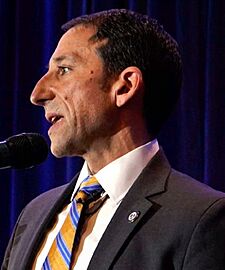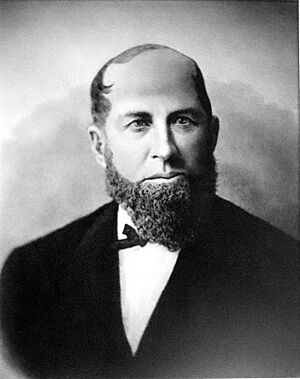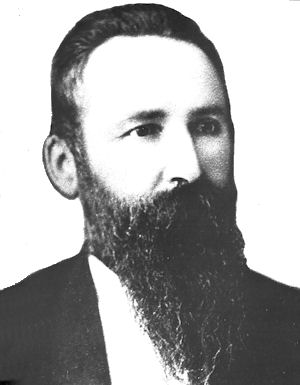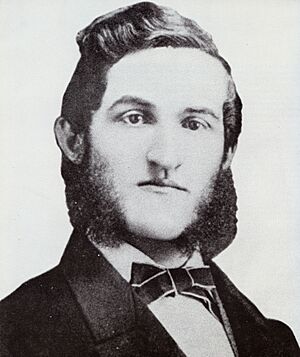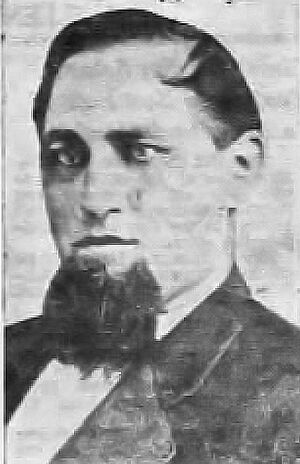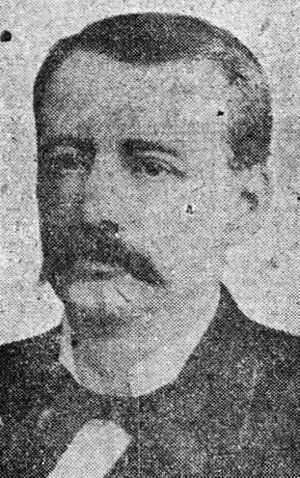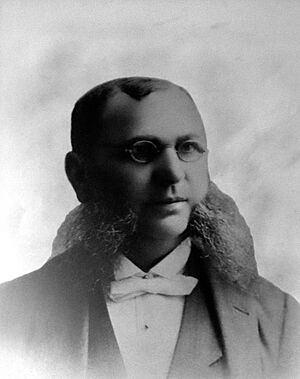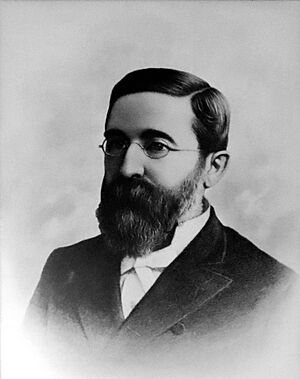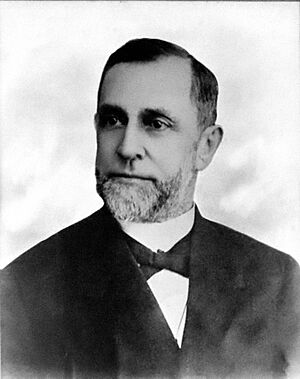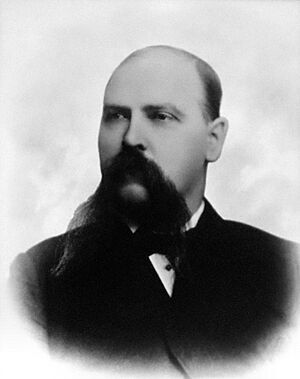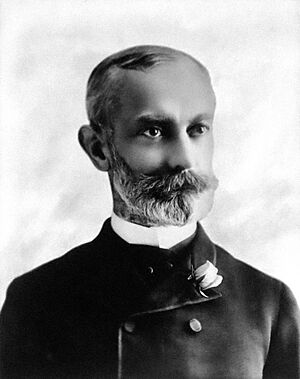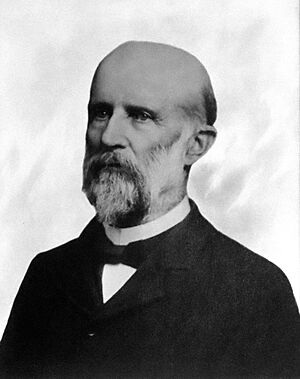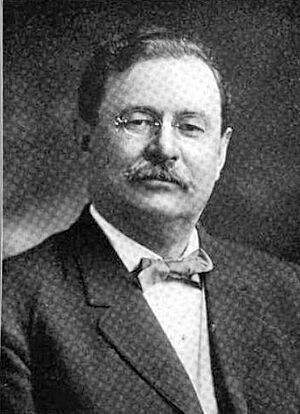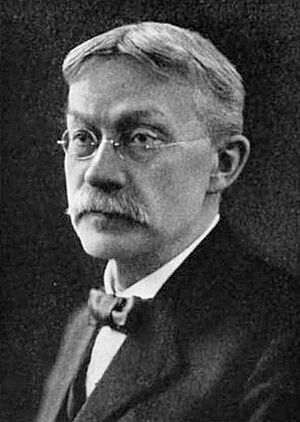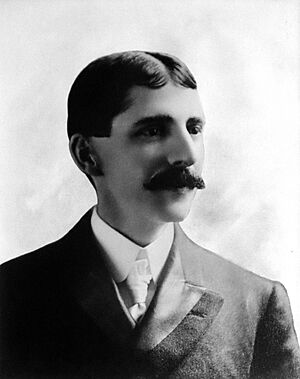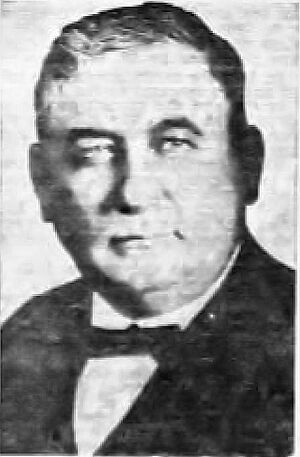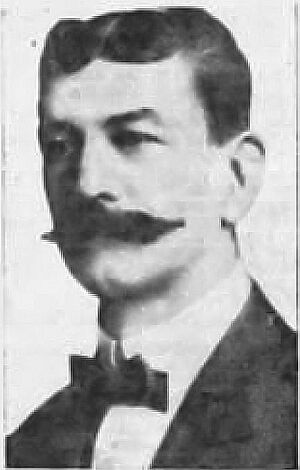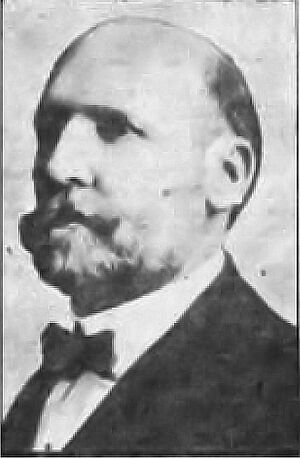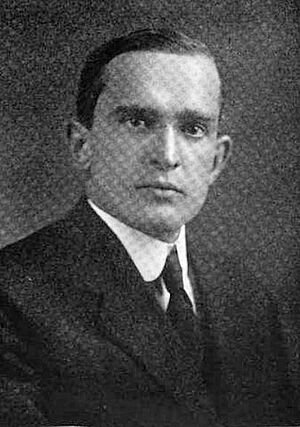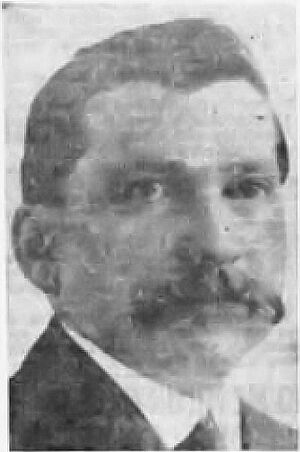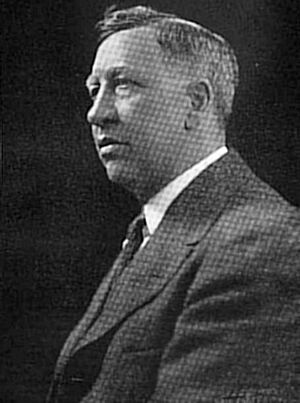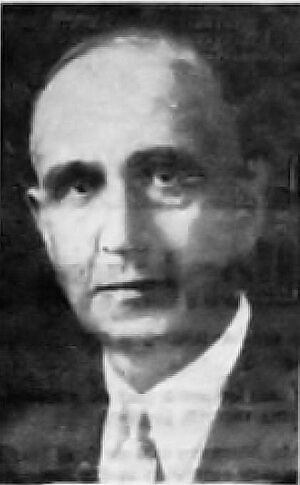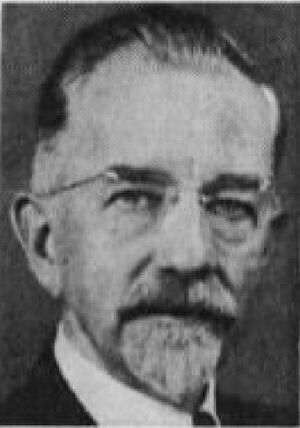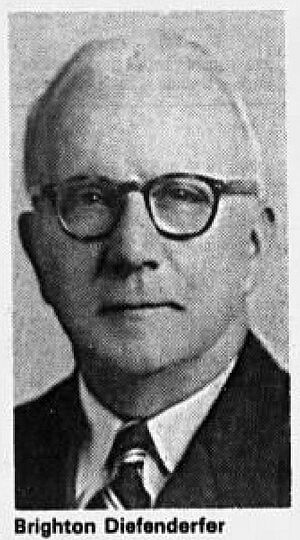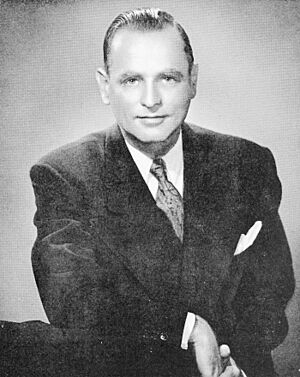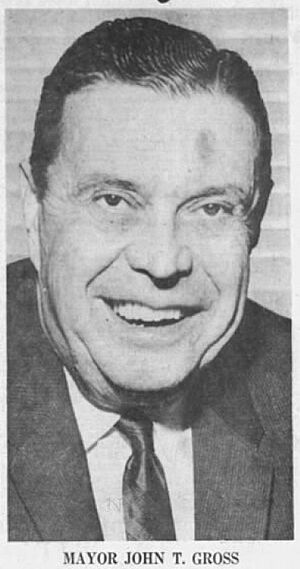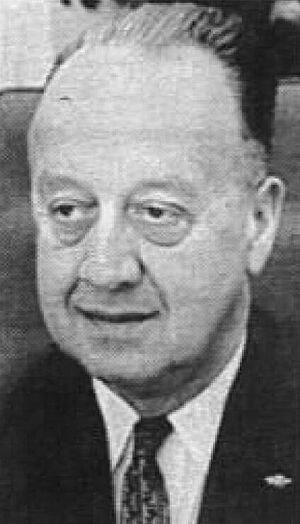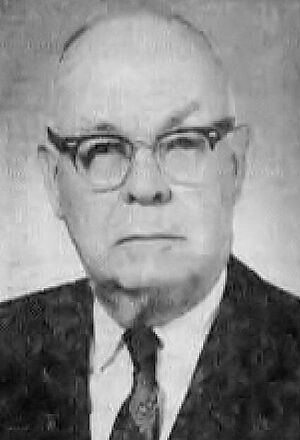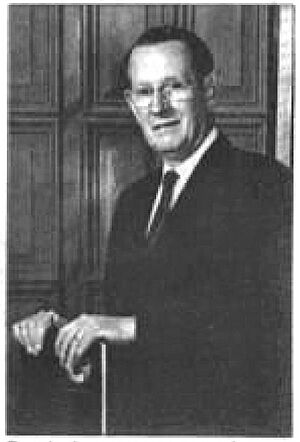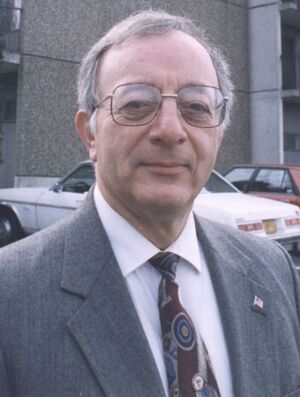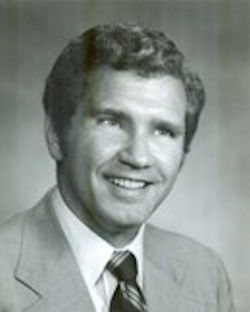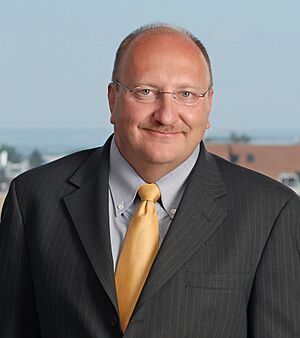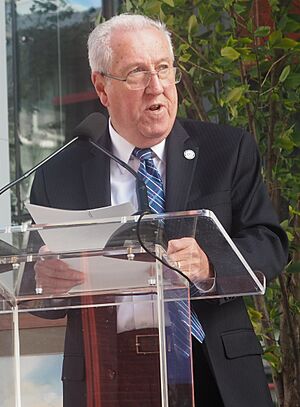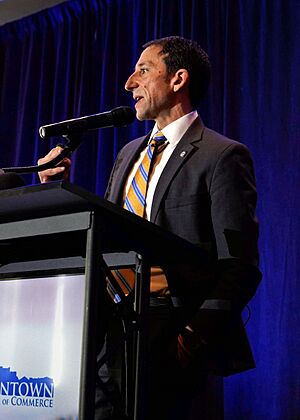Mayors of Allentown, Pennsylvania facts for kids
Quick facts for kids Mayor of Allentown |
|
|---|---|
| Term length | Four years (renewable once) |
| Inaugural holder | Samuel McHose |
| Formation | 1867 |
| Website | Mayor's Office |
Allentown, Pennsylvania, is a big city in Pennsylvania, ranking as the third largest. It was started way back in 1762 by a rich merchant named William Allen. He called it Northampton Towne.
Contents
Allentown's Early Days
For its first 50 years, Northampton Towne was a small place. It had just a few homes, shops, and inns. By 1810, over 700 people lived there. Because of this growth, the Commonwealth of Pennsylvania officially made it a borough on March 18, 1811. This meant it could have its own local government.
The first election for the borough was held at a local inn. Peter Rhodes was chosen as the first leader, called a burgess. George Rhoads became the town clerk, and John F. Rhue was the High Constable. A town council was also set up to make rules. One of their first rules was to stop cows from wandering on public streets!
In 1812, Lehigh County was created from part of Northampton County. Northampton Towne became the main town, or county seat, for Lehigh County.
Becoming Allentown
On April 16, 1836, the name of the community officially changed from Northampton Towne to Allentown. John P. Rhue was the burgess at that time. Before it became a city, Allentown had 47 yearly elections for burgess. John J. Krauss was a notable burgess, elected five times in a row from 1830 to 1835. William Kern was the last burgess, elected in 1866.
Allentown's Mayors
In 1866, Allentown's different areas, called wards, started to combine their services. This led to having one police department and a single city council. By 1867, a state senator named George P. Shall suggested making Allentown a city.
The state government agreed on March 12, 1867, and the City of Allentown was officially created. The first city election happened on May 1. The city's first plan for government had two parts: a Select Council and a Common Council.
First City Government (1867-1913)
| Photo | Name | Term(s) | Party |
|---|---|---|---|
|
|
|||
| 1 – Samuel Milton McHose | 1867–1869 | Republican | |
|
Samuel McHose was the first mayor under Allentown's first city plan. He started his term on May 19, 1867. He was born in 1816 in Lower Saucon. Samuel started a fire brick company in Allentown in 1854. He was also a strong supporter of ending slavery in the 1850s. He even went to a big meeting in 1860 where Abraham Lincoln was chosen to run for president. As mayor, McHose helped bring more industries to the city after the Civil War. He passed away in 1893. |
|||
| 2, 5 – Colonel Tilghman H. Good | 1869–1873 1874–1876 |
Democrat | |
|
Tilghman H. Good was born in 1830. He moved to Allentown as a child and became a shoemaker. He later worked at a bank and managed a hotel. During the Civil War, he helped organize and lead Pennsylvania volunteer units. He was a colonel in the 47th Pennsylvania Infantry and fought in battles in South Carolina and Louisiana. After the war, he became a hotel owner and was elected mayor in 1869. He served again from 1874 to 1876. He died in 1887 from a heart attack. |
|||
| 3 – Dr. Theodore Conrad. Yeager | 1873–1874 | Republican | |
|
Theodore C. Yeager was born in Allentown in 1838. He was the first mayor born in the city. He studied at Allentown Seminary (now Muhlenberg College) and later became a doctor. During the Civil War, he served as an assistant surgeon. He became mayor in 1873. Sadly, he died in January 1874 due to illness. People remembered him as a very efficient and honest leader. |
|||
| 4 – Herman Schuon | 1874–1876 | Non-Partisan | |
|
Herman Schuon was born in Germany in 1835 and came to Allentown when he was 16. He worked in the hotel business and later opened a grocery store. He served in the Civil War. He was a member of the City Council and became mayor in 1874 after Mayor Yeager's death. He did not run for re-election. Schuon was also a talented musician and helped start the Allentown Band. He died in 1912. |
|||
| 6 – Col. Edward B. Young | 1876–1878 | Republican | |
|
Edward B. Young was known as the "Centennial Mayor." He was born in Allentown in 1836. He fought in the 49th Pennsylvania Infantry during the Civil War, including the Battle of Gettysburg. After the war, he was involved in various businesses. He was a popular mayor. He died in 1878, shortly after leaving office. |
|||
| 7 – Dr. Alfred J. Martin | 1878–1880 | Democrat | |
|
Alfred J. Martin was born in Allentown in 1837. He became a medical doctor after graduating from the University of Pennsylvania in 1857. As mayor, he supported business growth and helped Civil War veterans and their families with medical care. He was also involved in banking and medical societies. He died in 1896. |
|||
| 8 – Dr. Edwin G. Martin | 1880–1884 | Democrat | |
|
Edwin G. Martin was Alfred J. Martin's brother, born in 1836. He also became a medical doctor. He took over his father's medical practice. He was elected mayor in 1880 and re-elected in 1882. He continued many of the good ideas his brother started. He stepped down in 1884 to return to his medical practice. He died in 1893. |
|||
| 9 – Edwin S. Shimer | 1884–1886 | Republican | |
|
Edwin S. Shimer was born in 1832. He moved to Allentown in 1849 and worked in dry goods stores. Later, he started his own business selling carpets and draperies. He was elected mayor in 1884. His time as mayor was known for being very professional, and the Allentown Police Force was seen as a great example of efficiency. The city also grew bigger during his term. He stepped down in 1886. He died in 1902. |
|||
| 10 – Werner Knauss Rhue | 1886–1888 | Democrat | |
|
Werner Knauss Rhue was born in Allentown in 1843. He was a Civil War veteran, fighting in battles like Gettysburg and Antietam. After the war, he worked for the Allentown Democrat newspaper. He was also a volunteer firefighter and later became Chief Engineer of the Allentown Fire Department. He was elected mayor in 1886 and served one term. He died in 1904. |
|||
| 11, 13 – Henry Willard Allison | 1888–1890 1893–1896 |
Republican | |
|
Henry Willard Allison was born in Kentucky in 1846. He worked in the iron industry and later in coal mining. In 1875, he joined Allentown Rolling Mills. He was elected mayor in 1888. During his term, streetcar service in downtown Allentown changed from horse-drawn to electric. He served a second time from 1893 to 1896. He helped expand Allentown's business area. He died in 1913. |
|||
| 12 – Colonel Samuel D. Lehr | 1890–1893 | Republican | |
|
Samuel D. Lehr was born in Allentown in 1838. He worked in engineering and construction. He served as a Captain in the Civil War. After the war, he became Allentown's Chief Engineer. He was also a Colonel in the Pennsylvania militia. He was elected mayor in 1890. During his term, new train stations were built in Allentown. He resigned in 1893 to work in private engineering. He died in 1915. |
|||
| 14, 16, 25 – Fred Ewing Lewis | 1896–1899 1902–1905 1932–1936 |
Republican | |
|
Fred Ewing Lewis was the first person to be mayor of Allentown three times. He was born in Allentown in 1865. He studied law and became a lawyer and bank president. He was first elected mayor in 1896. He served again from 1902 to 1905. He also served in the U.S. House of Representatives. His third term as mayor was during the Great Depression (1932–1936). He died in 1949. |
|||
| 15 – James L. Schaadt | 1899–1902 | Republican | |
|
James L. Schaadt was born in 1856. He was a lawyer and teacher. He was active in politics and served as a county solicitor. He was also a volunteer firefighter and a captain in the Pennsylvania National Guard. He was elected mayor in 1899. During his term, the Civil War monument at Center Square was built. He also helped expand telephone and electricity services in the city. He died in 1924. |
|||
| 17 – Dr. Alfred J. Yost | 1905–1907 | Democrat | |
|
Alfred J. Yost was born in 1870 and became a physician. He was elected mayor in 1905. He died in office in April 1907. A major achievement during his time was working with Harry Clay Trexler to develop West Park, which was Allentown's first public park. He believed in making the city more beautiful with flowers and encouraged planting floral boxes downtown. |
|||
| 18 – Dr. Charles D. Schaeffer | 1907–1908 | Democrat | |
|
Charles D. Schaeffer was born in 1864 and became a medical doctor. He was appointed mayor in April 1907 after Mayor Yost's health declined. During his time as mayor, he focused on developing the Allentown Hospital Nursing College and improving the city's public water supply. He died in 1923. |
|||
| 19 – Harry G. Stiles | 1908 | Democrat | |
|
Harry G. Stiles was born in Allentown in 1856. He graduated from Allentown High School and later from Harvard University. He became a lawyer and served as District Attorney. He was elected mayor of Allentown in 1908. He died in office in November 1908, after serving for 10 months. |
|||
| 20 – Dr. Henry Herbert Herbst | 1908–1909 | Democrat | |
|
Henry Herbert Herbst was born in 1858 and became a medical doctor. He was appointed mayor in 1908 after Harry G. Stiles passed away. During his term, he continued plans for the Allentown Water Works and expanded the public school system. After his time as mayor, he did a lot of work for the Allentown School District. An elementary school was named after him. He died in 1911. |
|||
| 21 – Charles O. Hunsicker | 1909–1911 | Republican | |
|
Charles O. Hunsicker was born in Allentown in 1878. He became a lawyer. In 1909, at age 31, he was elected Mayor of Allentown, making him the youngest mayor in the city's history. Hunsicker was also a real estate developer and built many homes in the city, especially in the West End. An elementary school is named after him. He died in 1941. |
|||
Commission City Government (1913-1970)
| Photo | Name | Term(s) | Party |
|---|---|---|---|
|
|
|||
| 22 – Charles W. Rinn | 1912–1915 | Democrat | |
|
Charles W. Rinn was born in 1868. He was elected mayor in 1911. During his term, Allentown became a "Third-Class City" in Pennsylvania, which led to a new way of governing. He was the first mayor under this new "commission" system. He reorganized the Allentown Police Department and helped build Hanover Avenue, a major road into the city. He also started the tradition of a Fourth of July celebration at the Allentown Fairgrounds and built the city's first sewage system. He died in 1920. |
|||
| 23 – Alfred L. Reichenbach | 1915–1919 | Non-Partisan | |
|
Alfred L. Reichenbach was born in Allentown in 1860. He was mayor during World War I. He was known for his love of flowers and helped beautify downtown Allentown with floral lamp posts. He also worked to restore Trout Hall, pave city streets, and establish a modern ambulance service. He helped design the current Allentown City Flag. He coordinated the city's efforts with the United States Army Ambulance Corps during World War I. He died in 1920. |
|||
| 24, 26 – Malcolm W. Gross | 1920–1932 1936–1940 |
Democrat | |
|
Malcolm W. Gross served as mayor for four terms, a total of 16 years, during the 1920s and 1930s. He was born in Allentown in 1872. During his first term, he worked to follow the Prohibition laws. In the 1920s, he worked with General Harry Trexler to create Allentown's park system, including the Allentown Rose Garden and Little Lehigh Parkway. He also expanded the Allentown Airport. He served a fourth term from 1936 to 1940, helping the city recover from the Great Depression by getting grants for projects that created jobs. The Allentown Rose Garden was renamed the Malcolm W. Gross Memorial Rose Garden in his honor. He died in 1944. |
|||
| 27 – George F. Erich | 1940–1944 | Democrat | |
|
George F. Erich was born in Allentown in 1899. Before becoming mayor, he was a successful coal and building supply dealer. As mayor, he supported public housing and improving older buildings. He also started a program to repave streets and organized metal scrap drives during World War II. During his term, Allentown received major defense contracts, leading to the expansion of industries like Mack Truck. He died in 1947. |
|||
| 28, 30 – Brighton C. Diefenderfer | 1944–1948 1952–1956 |
Republican | |
|
Brighton C. Diefenderfer was born in Allentown in 1902. He served two terms as mayor. During his time, the Allentown-Bethlehem-Easton (ABE) Airport opened a new terminal. He helped manage the city's change from wartime industry to peacetime growth. He also oversaw Cold War air raid drills and the establishment of Civil Defense shelters in schools. Industrial development expanded in southwest Allentown with new manufacturing plants. He died in 1982. |
|||
| 29, 31 – Donald V. Hock | 1948–1952 1956–1960 |
Democrat | |
|
Donald V. Hock was born in 1910. He was a lawyer and a veteran of World War II. He was elected mayor in 1947. As mayor, he helped create a wage tax for Allentown and started a meter maid system for parking. He also worked to develop Queen City Airport. In 1957, he had the idea to make Allentown's St. Patrick's Day parade a big citywide event. New schools like Dieruff High School and South Mountain Jr. High School opened during his terms. He died in 1986. |
|||
| 32 – John T. "Jack" Gross | 1960–1964 | Democrat | |
|
John T. "Jack" Gross was born in Allentown in 1909, and he was the son of former mayor Malcolm W. Gross. He was elected mayor in 1959. During his time, an industrial park was developed at Queen City Municipal Airport. Allentown was chosen as an "All-America City" in 1963. He also worked to keep Mack Trucks in Allentown by offering tax benefits. He began studies to turn downtown Hamilton Street into a pedestrian shopping area, which later became the Hamilton Mall. He died in office in September 1964. |
|||
| 33 – F. Willard Harper | 1964–1966 | Republican | |
|
F. Willard Harper was born in 1928. He was appointed mayor by the city council after John Gross passed away. During his 15 months as mayor, he saw the completion of several projects started by Mayor Gross, including the redevelopment of areas along South Lehigh Street. Trexler Jr. High School also began construction during his term. He died in 1981. |
|||
| 34 – Raymond B. Bracy | 1966–1970 | Democrat | |
|
Raymond B. Bracy was born in 1901. Before becoming mayor, he led a large construction company. He became mayor in 1966. He worked to complete citywide sewer services and expand the sewage treatment plant. He also helped establish the Allentown Human Relations Commission. He started changes to the city's government plan. He retired from politics after being defeated in the 1969 Democratic primary. He passed away in 1983. |
|||
Strong Mayor City Government (1970-1996)
| Photo | Name | Term(s) | Party |
|---|---|---|---|
|
|
|||
| 35 – Clifford S. J. "Chips" Bartholomew | 1970–1974 | Republican | |
|
Clifford S. J. "Chips" Bartholomew was born in Allentown in 1904. He was the first "Strong Mayor" under Allentown's current government system, which started in 1970. Before becoming mayor, he was a long-time educator, serving as a teacher, counselor, and principal at Allentown High School. As mayor, he started a 911 emergency dispatching system, created the police department's K-9 Corps, and began a citywide newspaper recycling program. His most lasting achievement was turning the Hamilton Street Central Business District into the "Hamilton Mall," a large shopping area with a brick walking surface and canopies. He died in 1999. |
|||
| 36, 38 – Joseph S. Daddona | 1974–1978 1982–1994 |
Democrat | |
|
Joseph S. Daddona was born in Allentown in 1933. He served four terms as mayor over two different periods, holding the office for 16 years. He graduated from Allentown High School and later Lehigh University with a degree in civil engineering. His accomplishments included introducing 911 dialing, starting waste-recycling programs, and creating new parks and fire stations. Allentown received its second "All-America City" award during his time as mayor in 1975. In 1983, he asked Billy Joel to donate money from his song Allentown to help aspiring artists. He stepped down as mayor in 1994 and later hosted local radio and TV shows. He died in 2004. |
|||
| 37 – Colonel Frank R. Fischl, Jr. | 1978–1982 | Republican | |
|
Frank R. Fischl, Jr. was born in Allentown in 1926. He graduated from Allentown High School and the United States Military Academy at West Point. He had a distinguished career in the United States Air Force, flying combat missions in Korea and Vietnam. He received many awards for his bravery. Fischl became mayor in 1978. He worked to encourage economic development by offering tax breaks to businesses. He did not seek a second term due to health reasons. He died in 2016. |
|||
Home Rule City Government (1996-Present)
| Photo | Name | Term(s) | Party |
|---|---|---|---|
|
|
|||
| 39 – William L. Heydt | 1994–2002 | Republican | |
|
William L. Heydt was born in Allentown in 1938. He was elected mayor in 1993 and re-elected in 1997. He focused on economic development, helping to redevelop the former Hess Brother's building. He also started the "Lights in the Parkway" Christmas display. During his term, the sidewalk canopies of the Hamilton Mall were removed, and the street addresses changed back to "Hamilton Street." He passed away in April 2025. |
|||
| 40 – Roy C. Afflerbach | 2002–2006 | Democrat | |
|
Roy C. Afflerbach was born in Allentown in 1945. He was a former Pennsylvania State Senator before being elected mayor in 2001. Early in his term, he reorganized the Allentown Police Department and negotiated new contracts, which caused financial difficulties for the city. He proposed laying off city employees to balance the budget. He did not seek re-election after one term. After leaving office, he became a public policy consultant. |
|||
| 41 – Edwin E. "Ed" Pawlowski | 2006–2018 | Democrat | |
|
Edwin E. "Ed" Pawlowski served four terms as mayor of Allentown. He was born in Chicago in 1965 and moved to Allentown in 2000. He was elected mayor in 2005. After taking office, he worked to fix the city's financial problems and renegotiate contracts. His biggest project was the Central Business District Redevelopment, which brought new businesses and buildings to downtown Allentown, including the PPL Center. Coca-Cola Park, a baseball stadium, opened in 2008, and the PPL Center, a hockey arena, was completed in 2014. In 2017, Allentown voters approved a two-term limit for mayors. Pawlowski resigned in March 2018 due to serious legal issues. His time as mayor is remembered for transforming Allentown's downtown, but also for the problems that led to his resignation. |
|||
| 42 – Ray O'Connell | March 29, 2018 – January 3, 2022 | Democrat | |
|
Ray O'Connell was born in Allentown in 1949. He worked for the Allentown School District for many years as a teacher, principal, and administrator. In 2009, he was elected to the Allentown City Council and became council president. After Mayor Pawlowski's resignation in March 2018, O'Connell was chosen as interim mayor. He was later elected to fill the rest of Pawlowski's term. His main goal was to restore trust in Allentown's government and improve employee morale. He also raised property taxes to help the city's finances. His term was affected by the COVID-19 pandemic. He was defeated in the May 2021 primary election. |
|||
| 43 – Matthew Tuerk | Jan 3, 2022 – Present | Democrat | |
|
Matt Tuerk was born in Pennsylvania in 1975 to a Cuban-American family. He moved to Allentown in 2008, working for the Allentown Economic Development Corporation. In 2013, he helped transform the Lehigh Valley Economic Development Corporation. He ran for mayor in 2020 and won the Democratic primary in May 2021. He then won the general election in 2021, becoming Allentown's first Latino mayor. He started his term on January 3, 2022. |
|||
See also


